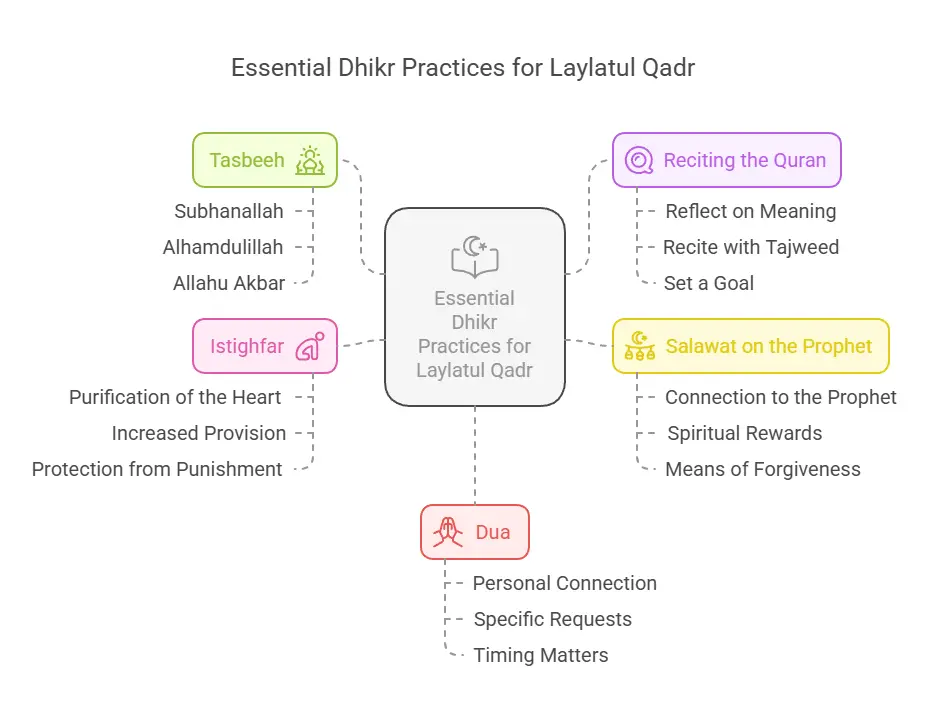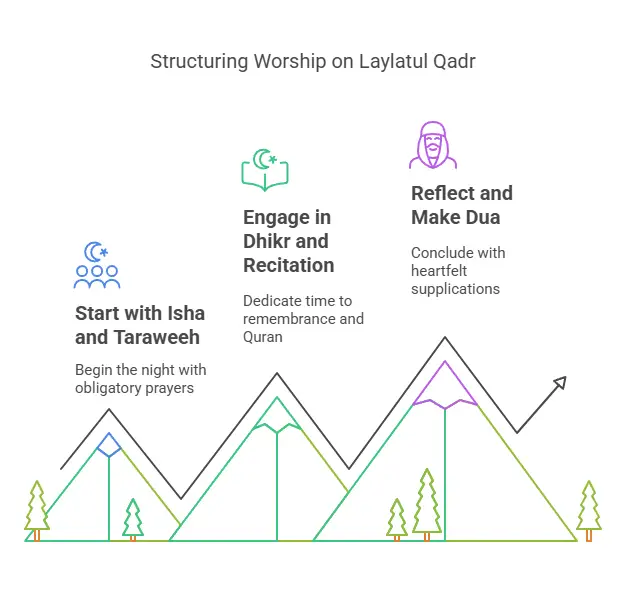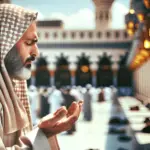
In this comprehensive guide, we will explore the significance of Dhikr on Laylatul Qadr, offering practical advice on how to maximize your spiritual rewards during this blessed night.
From understanding the different types of Dhikr to structuring your night for optimal worship, this article will provide you with everything you need to make the most of Laylatul Qadr.
Whether you are a seasoned worshipper or new to the practice of Dhikr, this guide will help you deepen your connection with Allah and unlock the full potential of this holy night.
Essential Dhikr for Laylatul Qadr (Practices)
Laylatul Qadr, the Night of Power, is a time when the gates of mercy are wide open, and the rewards for worship are multiplied manifold.
Engaging in Dhikr for Laylatul Qadr (remembrance of Allah) is one of the most powerful ways to connect with Allah on this blessed night.
Below, we explore five essential Dhikr practices that can help you maximize your spiritual rewards during Laylatul Qadr.
The Power of Tasbeeh (Subhanallah, Alhamdulillah, Allahu Akbar)
Tasbeeh, or the glorification of Allah, is one of the simplest yet most profound forms of Dhikr for Laylatul Qadr.
The phrases “Subhanallah” (Glory be to Allah), “Alhamdulillah” (Praise be to Allah), and “Allahu Akbar” (Allah is the Greatest) are often recited together and hold immense spiritual significance.
- Subhanallah: This phrase acknowledges Allah’s perfection and freedom from any imperfection. It is a reminder of His greatness and our humility.
- Alhamdulillah: Expressing gratitude to Allah for His countless blessings helps cultivate a heart full of thankfulness.
- Allahu Akbar: Declaring Allah’s supremacy reinforces our reliance on Him and diminishes the importance of worldly concerns.
The Prophet Muhammad (PBUH) encouraged Muslims to recite these phrases frequently. In a Hadith, he said,
“Whoever says ‘Subhanallah wa bihamdihi’ (Glory be to Allah and praise Him) 100 times a day, his sins will be forgiven even if they were like the foam of the sea” (Sahih Bukhari).
On Laylatul Qadr, repeating these phrases with sincerity can purify the heart and draw you closer to Allah.
Practical Tip: Use a Tasbeeh counter or your fingers to keep track of your recitations. Aim to recite each phrase 33 times, as taught by the Prophet (PBUH).
Reciting the Quran: The Ultimate Dhikr
Reciting the Quran is not only an act of worship but also the ultimate form of Dhikr for Laylatul Qadr.
Laylatul Qadr is the night the Quran was revealed, making it especially significant to engage with the holy book during this time.
- Reflect on the Meaning: While reciting, take time to ponder over the verses. The Quran is a guide for life, and reflecting on its teachings can bring immense spiritual clarity.
- Recite with Tajweed: Proper pronunciation and melody enhance the beauty of Quranic recitation and deepen your connection with the words of Allah.
- Set a Goal: Whether it’s completing a specific Surah or a Juz, having a goal can help you stay focused and motivated.
The Prophet Muhammad (PBUH) said,
“Whoever recites a letter from the Book of Allah, he will be credited with a good deed, and a good deed gets a ten-fold reward” (Sunan At-Tirmidhi).
On Laylatul Qadr, this reward is multiplied exponentially.
Practical Tip: Choose Surahs that are known for their profound meanings, such as Surah Al-Qadr, Surah Al-Ikhlas, Surah Al-Fatiha, and Surah Ya-Sin.
The Significance of Salawat (Durood) on the Prophet (PBUH)
Sending blessings upon the Prophet Muhammad (PBUH), known as Salawat or Durood, is a highly recommended act of worship, especially on Laylatul Qadr.
- Connection to the Prophet (PBUH): Salawat strengthens your bond with the Prophet (PBUH), who is the ultimate guide and intercessor for humanity.
- Spiritual Rewards: The Prophet (PBUH) said, “Whoever sends blessings upon me once, Allah will send blessings upon him ten times” (Sahih Muslim). On Laylatul Qadr, these rewards are magnified.
- A Means of Forgiveness: Regularly sending Salawat can lead to the forgiveness of sins and elevate your status in the sight of Allah.
Practical Tip: Incorporate Salawat into your nightly routine. For example, after every Tasbeeh or Quranic recitation, send blessings upon the Prophet (PBUH) by saying, “Allahumma salli ‘ala Muhammad” (O Allah, send blessings upon Muhammad).
The Role of Istighfar (Seeking Forgiveness)
Istighfar, or seeking forgiveness from Allah, is a powerful form of Dhikr for Laylatul Qadr that cleanses the soul and opens the doors of mercy.
Laylatul Qadr is the perfect time to seek forgiveness for past sins and resolve to improve oneself.
- Purification of the Heart: Istighfar removes the stains of sin and brings peace to the heart.
- Increased Provision: The Prophet (PBUH) said, “Whoever consistently seeks forgiveness, Allah will provide for him from where he does not expect” (Sunan Ibn Majah).
- Protection from Punishment: Regularly seeking forgiveness safeguards you from Allah’s punishment and earns His mercy.
Practical Tip: Recite “Astaghfirullah” (I seek forgiveness from Allah) 100 times or more. You can also use the comprehensive Dua of Istighfar:
“Astaghfirullah al-‘adheem alladhi la ilaha illa huwa al-Hayy al-Qayyum wa atubu ilayh” (I seek forgiveness from Allah, the Magnificent, besides whom there is no deity, the Ever-Living, the Sustainer, and I repent to Him).
The Importance of Dua (Supplication) on Laylatul Qadr
Dua is the essence of worship and a direct line of communication with Allah. On Laylatul Qadr, the likelihood of your Dua being accepted is significantly higher.
- Personal Connection: Dua allows you to express your deepest desires, fears, and gratitude to Allah.
- Specific Requests: Ask for forgiveness, guidance, and blessings for yourself, your family, and the Ummah.
- Timing Matters: The last third of the night is the most auspicious time for Dua, as Allah descends to the lowest heaven and asks, “Who is calling upon Me, that I may answer Him?” (Sahih Bukhari).
Practical Tip: Prepare a list of Duas in advance, including both personal requests and general supplications for the Ummah. Some recommended Duas include:
- “Allahumma innaka ‘afuwwun tuhibbul ‘afwa fa’fu ‘anni” (O Allah, You are the Most Forgiving, and You love forgiveness, so forgive me).
- “Rabbana atina fid-dunya hasanatan wa fil-akhirati hasanatan wa qina ‘adhaban-nar” (Our Lord, grant us good in this world and good in the Hereafter, and protect us from the punishment of the Fire).
By incorporating these essential Dhikr for Laylatul Qadr practices into your worship on Laylatul Qadr, you can unlock the full spiritual potential of this blessed night.
May Allah accept your efforts and grant you His mercy, forgiveness, and blessings. Ameen.
Structuring Your Night: A Step-by-Step Guide
Laylatul Qadr is a night of immense spiritual potential, and how you structure your worship can significantly impact your experience.
By dividing the night into focused segments, combining Dhikr with Quranic recitation, and engaging in night prayers, you can maximize your spiritual rewards.
Below is a step-by-step guide to help you make the most of this blessed night.
Dividing the Night into Thirds: Prayer, Dhikr, and Reflection
One effective way to structure your night is by dividing it into three parts: Prayer, Dhikr, and Reflection. This approach ensures a balanced and comprehensive worship experience.
- First Third: Prayer (Isha and Taraweeh)
- Begin your night with the obligatory Isha prayer, followed by the Taraweeh prayer. Taraweeh is a special prayer performed during Ramadan and is highly recommended on Laylatul Qadr.
- Use this time to focus on your connection with Allah through Salah. Concentrate on the meaning of the verses recited during the prayer and strive for Khushu (humility and concentration).
- Second Third: Dhikr for Laylatul Qadr and Quranic Recitation
- Dedicate the middle portion of the night to Dhikr and Quranic recitation. This is an ideal time to engage in Tasbeeh, Salawat, Istighfar, and other forms of remembrance.
- Recite the Quran with reflection and understanding. Choose Surahs that resonate with you or focus on the last Juz of the Quran, which contains Surahs often recited during night prayers.
- Last Third: Reflection and Dua
- The final third of the night is the most auspicious time for Dua and reflection. Use this time to make heartfelt supplications, seek forgiveness, and reflect on your spiritual journey.
- Reflect on your relationship with Allah, your goals, and areas for improvement. This is also a time to express gratitude for His blessings.
Practical Tip: Set a timer or use an app to divide the night into three equal parts. This will help you stay on track and ensure you allocate sufficient time to each activity.
Combining Dhikr with Quranic Recitation
Combining Dhikr with Quranic recitation can create a powerful and holistic worship experience.
Here’s how you can integrate these two practices:
- Recite and Reflect:
- After completing a portion of Quranic recitation, pause to reflect on the verses and engage in Dhikr. For example, if you recite a verse about Allah’s mercy, follow it with “Alhamdulillah” (Praise be to Allah) or “Subhanallah” (Glory be to Allah).
- Use Quranic Phrases for Dhikr for Laylatul Qadr:
- Incorporate Quranic phrases into your Dhikr. For instance, after reciting Surah Al-Ikhlas, you can repeat “Allahu Ahad” (Allah is One) as a form of Dhikr.
- Alternate Between Recitation and Dhikr:
- Alternate between reciting a few verses of the Quran and engaging in Dhikr. This keeps your worship dynamic and prevents monotony.
Practical Tip: Create a playlist or a schedule that alternates between Quranic recitation and Dhikr. For example, recite one page of the Quran, then spend 5 minutes in Dhikr before moving on to the next page.
The Power of Night Prayers (Tahajjud) on Laylatul Qadr
Tahajjud, the night prayer, is one of the most powerful acts of worship you can perform on Laylatul Qadr.
The Prophet Muhammad (PBUH) said, “The best prayer after the obligatory prayers is the night prayer” (Sahih Muslim).
- Timing:
- Tahajjud is performed in the last third of the night, making it an ideal complement to your Dua and reflection time. This is when Allah descends to the lowest heaven and asks, “Who is calling upon Me, that I may answer Him?” (Sahih Bukhari).
- How to Perform Tahajjud:
- Begin with two Rakats (units) of prayer, followed by additional Rakats as you wish. There is no fixed number, but the Prophet (PBUH) often prayed 8 Rakats.
- Recite longer Surahs or verses during Tahajjud to prolong your connection with Allah.
- Dua During Tahajjud:
- Use the Sujood (prostration) position to make heartfelt Duas. This is a time when your supplications are most likely to be accepted.
Practical Tip: Wake up at least an hour before Fajr to perform Tahajjud. Use this time to combine prayer, Dhikr, and Dua for a comprehensive worship experience.
By following this step-by-step guide, you can structure your night in a way that maximizes your spiritual rewards and deepens your connection with Allah.
May your worship on Laylatul Qadr be accepted, and may you experience the full blessings of this sacred night. Ameen.
Conclusion
Laylatul Qadr is a night of unparalleled spiritual significance, offering Muslims a unique opportunity to draw closer to Allah and seek His forgiveness and blessings.
Through the practice of Dhikr for Laylatul Qadr, we can purify our hearts, strengthen our faith, and experience the transformative power of this holy night.
By preparing diligently, structuring our worship, and avoiding common pitfalls, we can make the most of this blessed occasion.
As we approach Laylatul Qadr, let us remember the words of the Prophet Muhammad (PBUH):
“Whoever stands (in prayer) on Laylatul Qadr out of faith and hope for reward, his previous sins will be forgiven” (Sahih Bukhari).
Let us seize this opportunity to engage in heartfelt Dhikr, sincere supplication, and profound reflection. May Allah accept our worship and grant us the blessings of Laylatul Qadr.
FAQs
- What is the best time to perform Dhikr on Laylatul Qadr?
- The best time to perform Dhikr for Laylatul Qadr is during the last third of the night, when Allah descends to the lowest heaven and asks, “Who is calling upon Me, that I may answer Him?”
- Can I perform Dhikr in any language?
- While Dhikr is traditionally performed in Arabic, you can also remember Allah in your native language, especially when making personal supplications.
- How can I make my Dhikr more meaningful?
- Focus on the meaning of the words, maintain a sincere intention, and try to engage your heart in the remembrance of Allah.
- What should I do if I feel distracted during Dhikr?
- Take a moment to refocus, perhaps by changing your position or reciting a different Dhikr. Remember that distractions are normal, and the key is to gently bring your focus back to Allah.
- Is there a specific number of times I should repeat a Dhikr for Laylatul Qadr?
- While there are recommended numbers for certain Dhikr, such as repeating “Subhanallah” 33 times, the most important thing is the quality of your remembrance rather than the quantity.





